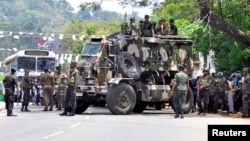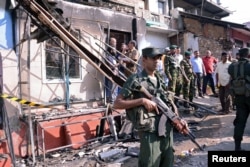Sri Lanka has blocked access to social media sites to prevent the spread of violence against members of the minority Muslim population, as the South Asian island remains under a state of emergency.
President Maithripala Sirisena imposed the decree Tuesday, a day after ethnic Sinhalese Buddhist mobs attacked several mosques, and dozens of Muslim-owned businesses in the central district of Kandy. The body of a young Muslim man who was trapped when fire burned down his parents' small shop was found by firefighters Tuesday.
The unrest began Saturday, when a Sinhalese truck driver reportedly clashed with a group of Muslim youths in Kandy. The driver died of his injuries the next day.
Internet providers began blocking access to Facebook, Instagram and WhatsApp Wednesday after messages began appearing threatening more attacks on Muslims.
Sporadic attacks continued Wednesday in the region despite the emergency decree. Police have imposed a strict curfew across much of the area in attempt to defuse the situation.
Sri Lanka remains deeply divided along religious and ethnic lines since the end of the 36-year civil war in 2009, when government forces crushed an insurgency by the ethnic Tamil minority seeking an independent homeland. Hardline Sinhalese Buddhist nationalists have accused Muslims of attacking sacred Buddhist sites and forcing people to convert.
Prime Minister Ranil Wickremesinghe condemned the "racist and violent acts" on Twitter Tuesday. "As a nation that endured a brutal war we are all aware of the values of peace, respect, unity & freedom," he wrote.
The U.S. Embassy in Colombo urged the government to act quickly against the perpetrators, protect the rights of religious minorities and lift the state of emergency as soon as possible.






